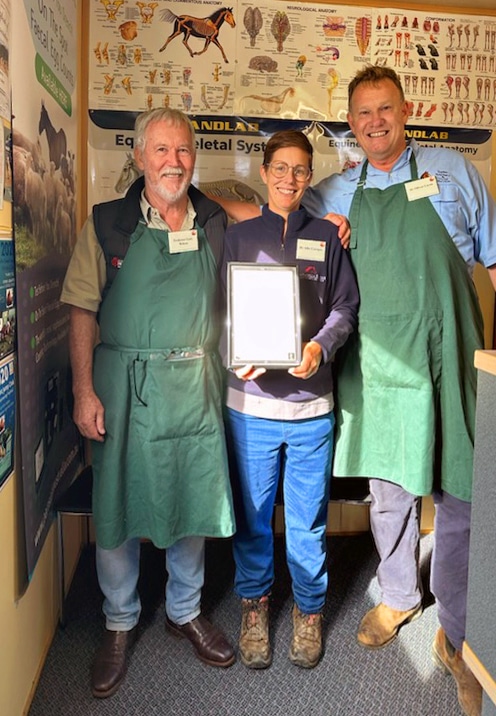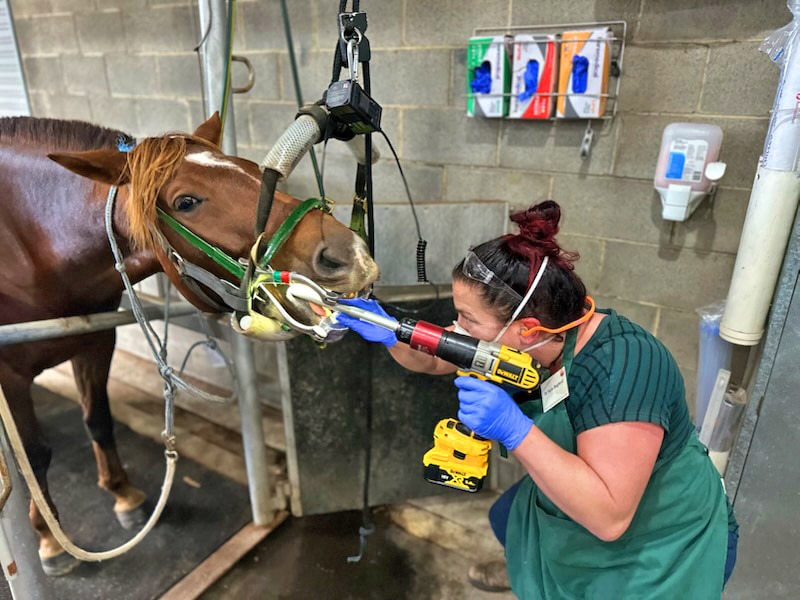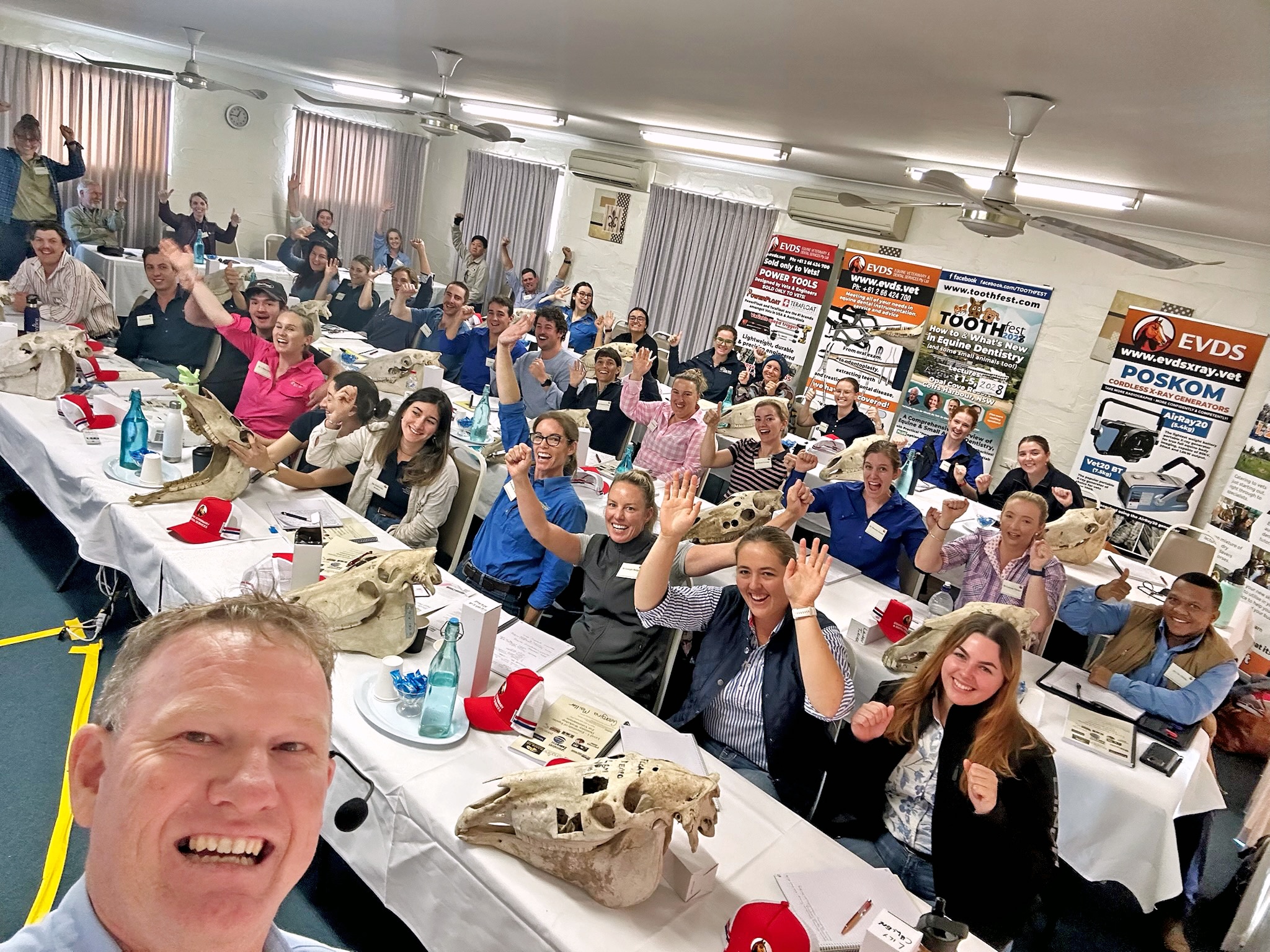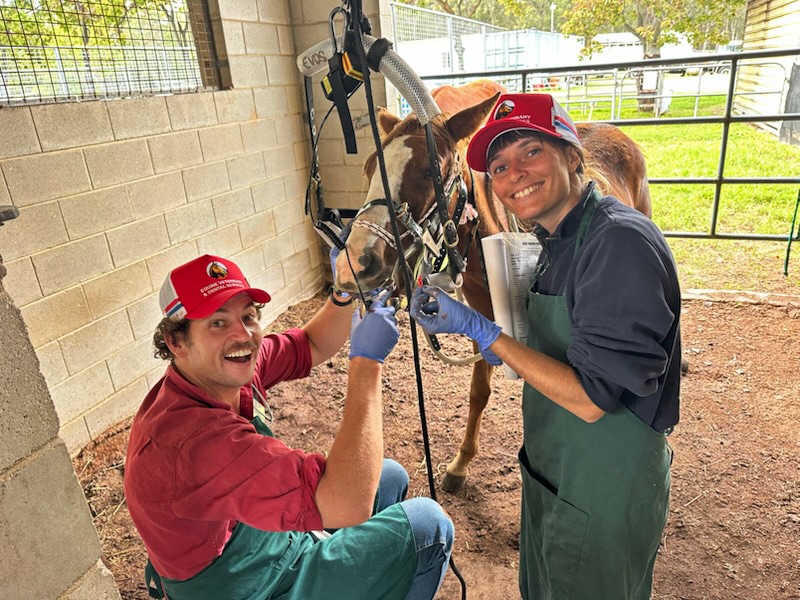The case of the vanishing vet
In this article, we look at two critical issues: the number of quasi-professionals offering equine dental services, and the rapidly declining numbers of equine vets.
Based in Grafton NSW, Dr Oliver Liyou has been a full-time veterinarian since graduating in 1993. He was employed in private practice for 10 years, before founding Equine Veterinary & Dental Services (EVDS), his equine-only clinic, in 2002.
Over the years, Oliver has employed more than 10 veterinarians in his rural clinic, and has delivered postgraduate training in equine dentistry to over 1,100 vets in over 60 equine dentistry workshops held across Australia. Now with more than 400 vets nationwide providing professional, quality dental care, he is moving closer to his goal of helping vets build sustainable, community-serving practices.
Knowing the equine veterinary profession as well as he does, there are a couple of things that Oliver finds deeply troubling: the first is the number of semi-qualified practitioners who are offering cheap and nasty equine dental services; the other is the rapidly declining number of equine vets. And if you think that’s a problem only in Australia, think again – it’s worldwide. And the shocking suicide rate among vets? That’s a global problem too.
But first, let’s tackle the dentistry issue. Having observed the number of semi-qualified people offering budget priced dental care for horses, Oliver wanted to address the problem, hence his mission to upskill vets though his much sought-after equine dental workshops. “I’m strongly of the opinion that dentistry for horses needs to be performed by properly trained veterinarians. After getting only seven vets to our first workshop, we’ve turned it around massively, to the point where Australian vets offering equine dental services is now probably at one of the highest rates in developed countries, largely because of the workshops.”

And Oliver has very good reason for insisting that equine dentistry should be offered only by veterinarians. “Horses require a thorough examination, both looking and feeling, to identify dental issues. Some problems you can see but not feel, others you can feel but not see. So often that means an x-ray is necessary, just as it is for us when we visit the dentist. Unfortunately, with many so-called practitioners, dental problems that need urgent attention aren’t picked up, and the horse just keeps eating. Even if they have a broken jaw, or a tooth root abscess, or if they’ve got pulp or nerve exposure, they’re incredibly resilient and will just keep eating despite mouth pain.”
But that’s not the worst of it. There is little or no regulation around equine dental care being offered by quasi-professionals. Yes, they may have completed a TAFE or similar course, but that in no way qualifies them to sedate a horse, or to extract a tooth – which, unless carried out by a vet is illegal here in Australia. Nor do they have the equipment or the knowledge to properly diagnose and treat the dental problems your horse may be experiencing. So, if you genuinely care about your horse’s wellbeing, the ‘but they’re cheaper than the dental vet’ argument really doesn’t fly! Particularly when you consider that proper dental care costs the same as one to one-and-a-half cups of coffee per week per horse. Makes you think, doesn’t it.
But there’s something else that’s just as, if not more worrying, and that’s the problem of the vanishing vet. To be specific, we’re not talking about vets who treat cats, dogs and other small animals, safe to say their practices are usually flourishing – but the story is far from the same for equine veterinarians.
Let’s pause for a moment and consider a scenario in which your horse needs urgent medical attention, but there’s no one to answer your call for help. That’s a situation that none of us would like to be in, yet unfortunately, it could be coming to a town near you in the very near future.
But what’s going on here? It’s an unwanted trend that Oliver has been trying to draw attention to for the past twenty years. “In the UK and US, it’s a similar scenario to Australia – and what’s happening is that it’s very hard to find vets to employ who want to work the hours, and the after-hours, when the reward for their time, effort, and the safety risks associated with tending to large animals is just not there.”
Oliver cites the example of a young vet he met recently at one of his workshops, who had been on call for 17 nights in a row, as well as being required to work her regular nine to five hours. That’s a punishing schedule by anyone’s standards. Then there’s the brilliant horse vet, a woman who Oliver graduated with, who has never had the time to have children and who is now utterly burned out by emergency calls.
And there’s this: “Some of the stories you hear from new graduates, and 90% of them are women, are that they’re fearful for their safety,” Oliver says. “They’re going out to farms in the dark where there’s no phone reception. They’ve never met the horse owner before, they could get kicked, they could get raped – it’s just atrocious.”

Besides burn out, chronic stress and safety issues, there’s another horrific statistic that haunts the veterinarian profession, and that’s the suicide rate – which as Oliver points out, is a heartbreaking marker of how dysfunctional and grindingly hard the profession is. “I’ve lost eight veterinary friends to suicide in 31 years,” he says, which sadly shouldn’t come as a surprise when you consider vets have between two to four times the average rate of suicide. In fact, according to the President of the Australian Veterinarian Association, the problem is at crisis level (see ‘Valuing your vet’ in our Jan/Feb 2022 issue).
In Oliver’s opinion, much of these problems slate back to equine veterinary practices being screwed down by pressure from clients. “Everything has to be cheaper, faster, and more available. The clients of many equine vets have their mobile number and will text or ring them at all hours,” Oliver explains. “Equine vet practices have built themselves on a model where they just keep delivering, giving so much that they end up burned out, with marriage breakdowns, all of that.”
Aware of the inherent problems, Oliver made a conscious decision not to offer emergency call outs when he started EVDS in 2002. “On two occasions I employed two other equine vets to cover emergencies, but both times it nearly sent the business under. Emergency work drains time and focus from doing elective services well, and it certainly would have stopped me from offering vet training courses. While I’ve felt guilt at times, I know this decision saved my career and postponed my exit from the profession.”
So, is there a way forward? Oliver believes there is, which is one of the motives underpinning his drive to educate vets in equine dentistry. “We have to have more elective work. Emergencies on their own represent five percent of your profit and ninety per cent of your stress. And yet, the horse industry largely thinks that vets are there for emergencies, and that they can call in a lay tooth rasper dentist for teeth. Dentistry is a massive part of the equation because it’s the most common disease in all mammals, more so than anything else. My suggestion is that the clients who use you for all of their elective work then qualify to have you come to an emergency for that horse. And I think until it all goes that way, nothing’s going to change.”
Elective work is your vet’s bread and butter. It’s the work that subsidises wages, rent and electricity, and the financial commitment associated with insurance and expensive equipment. Being limited to mainly emergencies is not only stressful, it also has a much lower rate of success and thus client satisfaction, particularly when things don’t go well and the client decides not to pay for the service they received. Inevitably, this means that to ensure the practice remains viable, the vet is forced to put up their fees, and the good people who pay end up subsidising those who do not.
Perhaps now’s the time to re-evaluate our relationship with our vets, who have devoted years to intensive study, whose lives are very far from easy, and who are burning out at an alarming rate. So, why not make the switch: have your trained vet care for your horse’s dental work as part of their overall health plan; don’t begrudge paying your vet bill; and appreciate your vet’s services – because there’s nothing sadder than not knowing what you’ve lost ´til it’s gone.
Over the years, Oliver has employed more than 10 veterinarians in his rural clinic, and has delivered postgraduate training in equine dentistry to over 1,100 vets in over 60 equine dentistry workshops held across Australia. Now with more than 400 vets nationwide providing professional, quality dental care, he is moving closer to his goal of helping vets build sustainable, community-serving practices.
Knowing the equine veterinary profession as well as he does, there are a couple of things that Oliver finds deeply troubling: the first is the number of semi-qualified practitioners who are offering cut rate equine dental services; the other is the rapidly declining number of equine vets. And if you think that’s a problem endemic to Australia alone, think again – it’s worldwide. And the shocking suicide rate among vets? That’s a global problem too.
But first, let’s tackle the dentistry issue. Having observed the number of semi-qualified people offering budget priced dental care for horses, Oliver wanted to address the problem, hence his mission to upskill vets though his much sought-after equine dental workshops. “I’m strongly of the opinion that dentistry for horses needs to be performed by trained veterinarians. After getting only seven vets to our first workshop, we’ve turned it around massively, to the point where Australian vets offering equine dental services is now probably at one of the highest rates in developed countries, largely because of the workshops.”

And Oliver has very good reason for insisting that equine dentistry should be offered only by veterinarians. “Horses require a thorough examination, both looking and feeling, to identify dental issues. Some problems you can see but not feel, others you can feel but not see. So often that means an x-ray is necessary, just as it is for us when we visit the dentist. Unfortunately, with many so-called practitioners, dental problems that need urgent attention aren’t picked up, and the horse just keeps eating. Even if they have a broken jaw, or a tooth root abscess, or if they’ve got pulp or nerve exposure, they’re incredibly resilient and will just keep eating despite mouth pain.”
But that’s not the worst of it. There is little or no regulation around equine dental care services being offered by quasi-professionals. Yes, they may have completed a TAFE course or something similar, but that in no way qualifies them to sedate a horse, or to carry out the extraction of a tooth. Nor do they have the equipment or the knowledge to properly diagnose and treat the dental problems your horse may be experiencing. So, if you genuinely care about your horse’s wellbeing, the ‘but they’re cheaper than the dental vet’ argument really doesn’t fly! Particularly when you consider that proper dental care costs the same as one to one-and-a-half cups of coffee per week per horse. Makes you think, doesn’t it.
But there’s something else that’s just as, if not more worrying, and that’s the problem of the vanishing vet. To be specific, we’re not talking about vets who treat cats, dogs and other small animals, safe to say their practices are usually flourishing – but the story is far from the same for equine veterinarians.
Let’s pause for a moment and consider a scenario in which your horse needs urgent medical attention, but there’s no one to answer your call for help. That’s a situation that none of us would like to be in, yet unfortunately, it could be coming to a town near you in the very near future.
But what’s going on here? It’s an unwanted trend that Oliver has been trying to draw attention to for the past twenty years. “In the UK and US, it’s a similar scenario to Australia – and what’s happening is that it’s very hard to find vets to employ who want to work the hours, and the after-hours, when the reward for their time, effort, and the safety risks associated with tending to large animals is just not there.”
Oliver cites the example of a young vet he met recently at one of his workshops, who had been on call for 17 nights in a row, as well as being required to work her regular nine to five hours. That’s a punishing schedule by anyone’s standards. Then there’s the brilliant horse vet, a woman who Oliver graduated with, who has never had the time to have children and who is now utterly burned out by emergency calls.
And there’s this: “Some of the stories you hear from new graduates, and 90% of them are women, are that they’re fearful for their safety,” Oliver says. “They’re going out to farms in the dark where there’s no phone reception. They’ve never met the horse owner before, they could get kicked, they could get raped – it’s just atrocious.”
Besides burn out, chronic stress and safety issues, there’s another horrific statistic that haunts the veterinarian profession, and that’s the suicide rate – which as Oliver points out, is a heartbreaking marker of how dysfunctional and grindingly hard the profession is. “I’ve lost eight veterinary friends to suicide in 31 years,” he says, which sadly shouldn’t come as a surprise when you consider vets have between two to four times the average rate of suicide. In fact, according to the President of the Australian Veterinarian Association, the problem is at crisis level (see ‘Valuing your vet’ in our Jan/Feb 2022 issue).
In Oliver’s opinion, much of these problems slate back to equine veterinary practices being screwed down by pressure from clients. “Everything has to be cheaper, faster, and more available. The clients of many equine vets have their mobile number and will text or ring them at all hours,” Oliver explains. “Equine vet practices have built themselves on a model where they just keep delivering, giving so much that they end up burned out, with marriage breakdowns, all of that.”

Aware of the inherent problems, Oliver made a conscious decision not to offer emergency call outs when he started EVDS in 2002. “On two occasions I employed two other equine vets to cover emergencies, but both times it nearly sent the business under. Emergency work drains time and focus from doing elective services well, and it certainly would have stopped me from offering vet training courses. While I’ve felt guilt at times, I know this decision saved my career and postponed my exit from the profession.”
So, is there a way forward? Oliver believes there is, which is one of the motives underpinning his drive to educate vets in equine dentistry. “We have to have more elective work. Emergencies on their own represent five percent of your profit and ninety per cent of your stress. And yet, the horse industry largely thinks that vets are there for emergencies, and that they can call in a lay tooth rasper dentist for teeth. Dentistry is a massive part of the equation because it’s the most common disease in all mammals, more so than anything else. My suggestion is that the clients who use you for all of their elective work then qualify to have you come to an emergency for that horse. And I think until it all goes that way, nothing’s going to change.”
Elective work is your vet’s bread and butter. It’s the work that subsidises wages, rent and electricity, as well as the financial commitment associated with insurance and expensive equipment. Being limited to mainly emergencies is not only stressful, it also has a much lower rate of success and thus client satisfaction, particularly when things don’t go well and the client decides not to pay for the service they received. Inevitably, this means that to ensure the practice remains viable, the vet is forced to put up their fees, and the good people who pay end up subsidising those who do not.
Perhaps now’s the time to re-evaluate our relationship with our vets, who have devoted years to intensive study, whose lives are very far from easy, and who are burning out at an alarming rate. So, why not make the switch: have your trained vet care for your horse’s dental work as part of their overall health plan; don’t begrudge paying your vet bill; and appreciate your vet’s services – because there’s nothing sadder than not knowing what you’ve lost ´til it’s gone.


